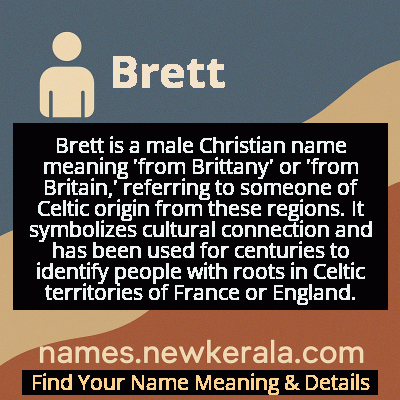Brett Name Meaning & Details
Origin, Popularity, Numerology Analysis & Name Meaning of Brett
Discover the origin, meaning, and cultural significance of the name BRETT. Delve into its historical roots and explore the lasting impact it has had on communities and traditions.
Name
Brett
Gender
Male
Origin
Christian
Lucky Number
2
Meaning of the Name - Brett
Brett is a male Christian name meaning 'from Brittany' or 'from Britain,' referring to someone of Celtic origin from these regions. It symbolizes cultural connection and has been used for centuries to identify people with roots in Celtic territories of France or England.
Brett - Complete Numerology Analysis
Your Numerology Number
Based on Pythagorean Numerology System
Ruling Planet
Moon
Positive Nature
Diplomatic, friendly, artistic, empathetic.
Negative Traits
Over-sensitive, moody, indecisive, prone to self-pity.
Lucky Colours
Green, cream, white.
Lucky Days
Monday.
Lucky Stones
Pearl, moonstone.
Harmony Numbers
1, 3, 4.
Best Suited Professions
Diplomats, mediators, caregivers, artists.
What People Like About You
Cooperative spirit, friendliness, artistic talent.
Famous People Named Brett
Brett Favre
Professional Football Player
NFL Hall of Fame quarterback and three-time NFL MVP
Brett Kavanaugh
Supreme Court Justice
Associate Justice of the Supreme Court of the United States
Brett Eldredge
Country Music Singer
Multi-platinum selling country artist with multiple chart-topping hits
Brett Hull
Professional Hockey Player
NHL Hall of Famer with 741 career goals and two Stanley Cups
Name Variations & International Equivalents
Click on blue names to explore their detailed meanings. Gray names with will be available soon.
Cultural & Historical Significance
Extended Personality Analysis
Individuals named Brett are commonly associated with a distinctive set of personality traits that blend strength with approachability. They typically exhibit natural leadership qualities combined with a personable demeanor that makes them effective in social and professional settings. Bretts are often described as confident without being arrogant, ambitious yet grounded, and competitive while maintaining strong ethical standards. Their communication skills tend to be well-developed, allowing them to express ideas clearly and persuade others effectively. Many display a practical problem-solving approach balanced with creative thinking, making them valuable in both traditional and innovative environments. The name suggests someone who is reliable and steadfast—qualities that inspire trust in personal and professional relationships. This combination of traits often leads Bretts to success in fields requiring both interpersonal skills and determined execution, from business and law to sports and entertainment. Their ability to adapt to changing circumstances while maintaining core principles makes them resilient and respected figures in their communities.
Modern Usage & Popularity
In contemporary naming practices, Brett maintains a stable presence as a classic yet modern masculine choice. While its peak popularity occurred in the late 20th century, particularly in the United States where it ranked among the top 100 names from the 1960s through the 1980s, it continues to be chosen by parents seeking a strong, straightforward name with international recognition. The name's single-syllable structure gives it a crisp, modern feel that works well in professional contexts, while its Celtic-French origins provide historical depth. Current usage trends show Brett as a reliable choice rather than a fashionable one, appealing to parents who prefer established names over trending options. Its association with successful figures in sports, entertainment, and other fields contributes to its enduring appeal. The name crosses socioeconomic and regional boundaries, appearing with consistent frequency across English-speaking countries and maintaining its position as a versatile, all-purpose masculine name suitable for various cultural backgrounds.
Symbolic & Spiritual Meanings
Symbolically, the name Brett represents bridges, boundaries, and cultural synthesis. Its etymological roots as an identifier for people from Brittany or Britain give it connotations of movement between lands and cultures, suggesting someone who connects different worlds or ideas. The name embodies the concept of the traveler or mediator who brings diverse perspectives together. In a metaphorical sense, Brett suggests stability and foundation—much like a brett or board provides structural support—while also implying adaptability and the ability to navigate changing circumstances. The name carries undertones of exploration and discovery, reflecting the historical Bretons who were known as seafarers and explorers. In personal symbolism, Brett often represents reliability combined with adventurousness, strength tempered with flexibility, and tradition informed by innovation. These layered meanings make the name particularly suited to individuals who balance multiple roles or bridge different communities, embodying the ideal of unity in diversity.

